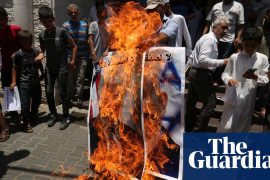Last year I wrote about Ehud Yaari’s excellent (2006) analysis of Hizballah’s doctrine of muqawama (which can be loosely translated as resistance but which was suggested to be a much more sinister entity) and the potential problems it presented to Israel then. The aim of the Islamist muqawama, according to Yaari, was not for Hizballah and its proxies to gain outright victory, but rather to wear away Israel’s resolve by terrorist attacks until she capitulated to Islamist demands. Psychological warfare was deemed to be as important as any other, and thus the muqawama could take many forms, including the sort of lies we see in the Guardian and other media (all, it seems, mindlessly fascinated by Islamism) as well as the more dramatic “death and glory” suicide murders by the shaheeds.
It seems that the latest major attempt to pursue the muqawama was the Iran-inspired hapless Gaza “Peace” flotilla which ultimately ended in defeat for those who began it. The propaganda and psychological cost to Israel was considerable at the time, however, because she did not anticipate or react quickly enough to the media’s own muqawama in support. The Islamists, having done their spade work during and after the last Lebanon war and Cast Lead, knew that their poisonous lies would fall on willing ears. The mainstream media like the Guardian and CiF in particular wrung everything they possibly could out of the situation (and predictably all of it bad about Israel). However, in spite of that (although in my opinion too late) the IDF’s camera footage told the truth about what happened. The IDF’s footage speaks for itself: thinking people are unlikely to be fooled any longer by the activists’ alleged “peaceful” intent.
Part of the Islamist approach to muqawama until comparatively recently was, as I have mentioned above, suicide bombing, not because it causes mass fatalities but because of its psychological impact.
However, Dr Nathan Toronto, a researcher at the Fort Leavenworth Military Studies Office reflected the observers’ growing curiosity about the greatly reduced number of attacks when he asked in 2008 “Where have all the bombers gone?”
According to Toronto, suicide terror was “gruesomely effective” in Israel, which makes the apparent abandonment of it by the Palestinian terrorist factions all the more puzzling, particularly when the global trend towards it is increasing. Toronto argues that this decrease cannot be explained only by the construction of the security barrier and increased surveillance of the Gaza crossings, although these are major contributory factors. If those were the only explanations, he argues, why did Hamas stop sending out suicide terrorists a full two years before Islamic Jihad’s suicide bombing attack in January 2007?
Toronto suggests that it is equally unlikely that the attacks almost ceased because of scarcity of resources such as money and materials and potential suicide bomber volunteers. Iranian funding is still available to Islamic Jihad and Hamas. Materials are being smuggled in regularly via Egypt, and Palestinian society is generally supportive of “martyrdom operations.”
Toronto therefore concludes that, as well as Israel’s preventative security measures, the Palestinian terrorist groups may well have actually become unwilling to perpetrate suicide terror operations. One explanation may be that these have not been as effective in inducing terror as the number of fatalities suggests (and this fact, if it is true, suggests remarkable emotional resilience on the part of Israelis).
The terror groups still maintain that they want to undermine and eradicate Israel but have shifted tactically away from sending out suicide terrorists towards what they believe to be a more terrifying alternative, that of indiscriminate shelling of civilians, which have increased over time as suicide terror attacks have decreased. Toronto argues that although southern Israel, and particularly Sderot, has taken a terrific pounding with the corresponding psychological battering, they constitute but a small area of Israel. Therefore the shift from suicide bombings to indirect missile fire does not make sense strategically.
What then does explain the shift away from suicide terror? Toronto suggests that Palestinian terror organisations have other strategic objectives besides coercing Israel. Their main objective may be less to change Israel’s behaviour than to market different brands of Palestinian resistance to impress the Palestinian populace. There is extensive inter-factional rivalry and animosity within Gaza and the West Bank and terrorist factions vie with each other to gain the approval of the Palestinians for their particular pursuit of the “one true path” to defeat Israel.
One suggestion is that as long as there are high levels of Palestinian support for armed attacks and as long as large numbers of Palestinians blame Israel for their plight, these terror factions will compete for the largest possible share of the “resistance market.”
Toronto says that this “resistance branding” has benefited by the substitution of shelling for suicide terror. Although the missile attacks kill far fewer people and affect fewer people, they do elicit responses, among them the embargo of goods into and out of Gaza. These are a boon to the terror organisations because more Palestinians blame Israel, rather than their leaders and the terrorists, for their reduced circumstances. Also, by launching missiles, the various factions are seen to be resisting, which bolsters their “resistance market share” of the support from the Palestinians.
Is the Palestinian muqawama against Israel failing? It is certainly not as effective as its perpetrators envisaged because Israel exists and thrives, but the main, and thankfully enduring, reason for the weakness of the muqawama may be as follows:
Toronto wrote in 2008 that Palestinian terror organisations were out to destroy each other just as much as they were out to destroy Israel. That still obtains today. More recently the events following Cast Lead, when Hamas tortured and killed Fatah members in Gaza, seem to offer further proof that for the Palestinian Islamist, proving and being seen to have superiority over opposing factions trumps any systematic application of that aggression towards eradicating Israel, regardless of what their spokesmen may say.
The key to the failure of the Palestinian Islamist muqawama lies in this essential nature of Islamist factional rivalry which, if Israel can find ways to make use of and exacerbate it, will sound its death knell. The IDF’s targeted killings of terrorist leaders increase the inter-factional confusion and their innate paranoia and mistrust of each other. However, the residual effects of the anti-Israel propaganda-based muqawama elsewhere in the world, will, I believe, be harder (although not impossible) to undermine. They are pervasive and ingrained and what is once heard or read cannot be unheard or unread, however untrue they may later be proven to be.
The best approach is for the Israeli government spokespeople to prepare a series of detailed counter-muqawama statements before any action taken, and issue them (amended where necessary) as quickly as possible once that action is under way to undermine the lies told in the media. The anti-Israel poison is in the media system and only steady and constant exposure to the truth will be a good enough antidote.




